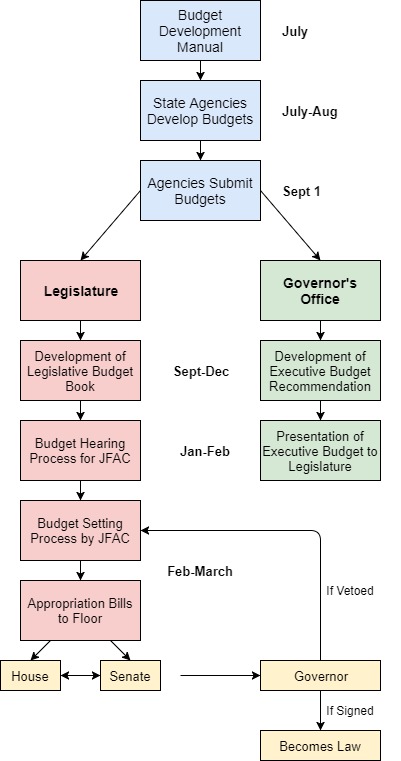Budget Process
Within the Division of Financial Management (DFM), the Budget Bureau is responsible for budget development. Budget development is a continual process throughout the year. It involves the legislative and executive branches with occasional counsel from the judicial branch. The following chart indicates the participants in the budget process.

Budget Development
The fiscal year runs from July 1 to June 30. Agencies begin preparing their budget requests for the next fiscal year 18 months in advance. For instance, for fiscal year 2020, which begins on July 1, 2019, agencies will prepare their request during July through August 2018. The Division of Financial Management and the Legislative Services Office - Budget and Policy Analysis, jointly prepare a Budget Development Manual that is sent to agencies in early June. The manual provides guidance on budget submittal procedures. This guidance includes detailed information on projected benefit increases, the percentage increase to be used for operating expense inflation, medical inflation, and Change in Employee Compensation (CEC).
Between July and August, agencies work with their assigned DFM budget analyst on the technical details of the budget proposal. In September, agencies submit their budgets simultaneously to the Division of Financial Management and Legislative Services Office. Throughout October and November, analysts work on technical details and meet with the Governor to present the agencies' requests and introduce options. The Governor completes his recommendation in early December and the Executive Budget goes to print. The Governor presents his recommendations to the legislature during the first week of the session that begins in January.
Legislative Appropriations
After the Executive Budget is printed and the Budget Message is given, the appropriation process begins. The Joint Finance-Appropriations Committee (JFAC) begins hearing testimony from agencies on their budget request and the Governor’s Recommendation. After all agencies have been heard, the budget setting process begins. JFAC creates an appropriation bill (legislation) that must pass both the House and the Senate and then must be signed by the Governor. The process starts over if the bill does not pass both the House and the Senate or if it is vetoed by the Governor.
Budget Execution
When passage of the appropriation bill is complete, agencies know what their budget will be for the upcoming fiscal year and can begin to plan accordingly. On July 1, the new budget will go into effect.
Adjustments to Budgets
Adjustments to budgets are ongoing throughout the year. The Legislature considers adjustments to the current year's budget through supplementals at the beginning of the budget setting process. DFM budget analysts monitor how spending is going throughout the year. The Governor can make budget adjustments such as holdbacks at any point in a year where revenues are not meeting projections. DFM analysts are authorized by the Board of Examiners to allow agencies to make budget transfers mid-year and to allow for the inclusion of federal grants, etc., that were unknown at the budget-setting time through a non-cognizable funds process.